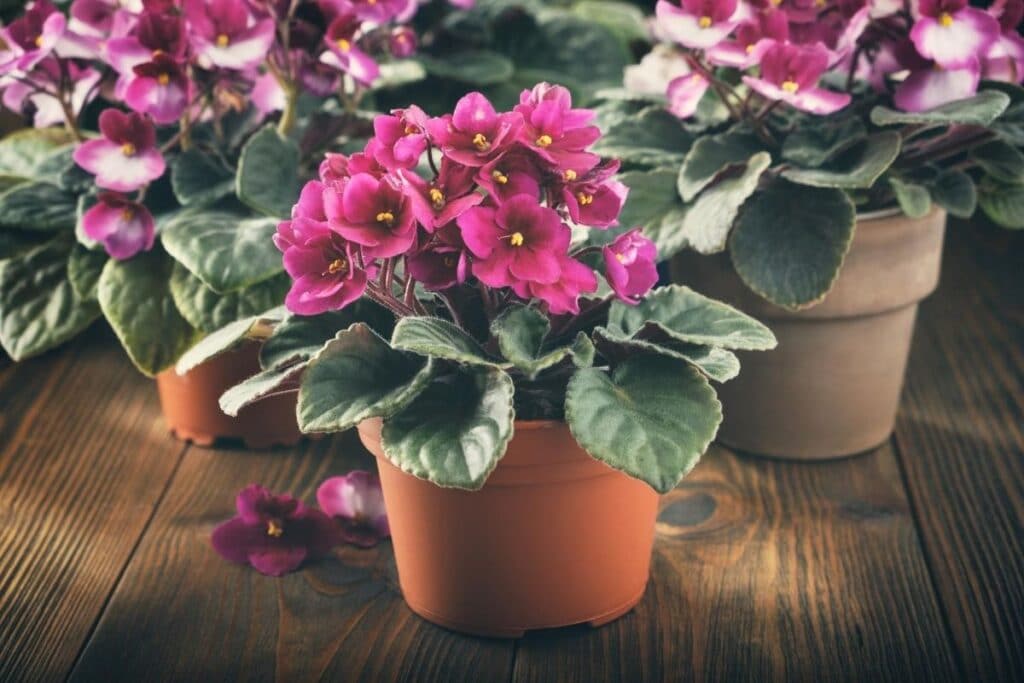Who doesn’t like pretty flowers inside their homes? Everybody loves to see a splash of color and African violet (Saintpaulia) is the perfect household plant for it. With its beautiful appearance and a variety of different cultivars, this plant is a household plant favorite without a doubt.
Of course, there is no perfect plant. There will be times that the plant will need some help from the grower, especially for fertilizer application.
Read on to know all about the best fertilizer for African violets.
Why do African Violet Plants Need Fertilizer
The main reasons fertilizer application is essential when it comes to caring for African violet are growth optimization and increasing the quantity and quality of flowers. Since its blooms are its main attraction, many growers prefer to plant them in pots and grow them as a household plant.
In general, potted plants depend on fertilizers for their nutrient replenishment. There is a limited supply of nutrients in one pot. This means that the nutrient reservoir for indoor plants is significantly smaller than the African violet plants directly planted in the landscape soil. African violet leaves turning yellow can be a sign of nutrient deficiencies or other issues.
In choosing the right fertilizer to use, the easiest way is by asking local garden shops for the recommended African violet fertilizers. They might have African violet-specific products that are tailored to fit the plant. However, it is important to know the basics of fertilizers.
Major Elements
Fertilizers have macroelements, Nitrogen, Phosphorus, and Potassium. These three nutrients are major elements that play a crucial role in the healthy growth of any plant.
Nitrogen helps for foliage development. Potassium helps plant carbohydrates (the chemicals that give plants energy) build up and move around. On the other hand, Phosphorus aids in healthy roots and the development of blooms.
Organic or Synthetic
Plants will benefit from either type of fertilizer. However, the difference between the two is the availability of nutrients for plant use. Of course in household plants, you want a fast-acting product. Synthetic fertilizers are best for this because they give all the nutrients in a short time. Although, organic fertilizers such as food scraps and manure may be used if time is not of the essence and the smell won’t bother you.
What Is The Best African Violet Fertilizer?
For Saintpaulia, the best fertilizer should have three characteristics: quick release, water-soluble, and urea-free product. Each feature mentioned is needed to suit the growing african violets requirements.
First, quick-release fertilizers are favored because they will replenish the nutrients in a short period, making the nutrients readily available for the plant’s consumption.
Then, water-soluble fertilizers are recommended because of the type of watering African violets usually need. Lastly, the use of fertilizers with ureas is discouraged as it can cause root damage.
Additionally, watering with room temperature water is beneficial for maintaining healthy plant growth.
How to Apply African Violet Fertilizer
After knowing the type of fertilizer needed, reading the labels for the recommended rate is the next step. Usually, the recommended rates of general fertilizers are reduced to a half or a third of their original amount for indoor plants. For example, a complete fertilizer (20-20-20 or 14-14-14) should be diluted in water.
For African violets grown under natural lighting, mix an eighth of a teaspoon of complete fertilizer with a gallon of water to create a concentrated liquid solution.
On the other hand, those grown under artificial light will need a quarter of a teaspoon of complete fertilizer dissolved in one gallon of water. Diluting the fertilizers will help prevent burns on the plant’s roots.
When to Apply African Violet Fertilizer
After knowing all the information mentioned above, the next step is to know when to feed Saintpaulia. Apply the fertilizer during the growing seasons. This will help the plant develop more green leaves and produce more food which will result in faster overall growth and better blooms.
Some growers fertilize during fall, summer, and the last weeks of spring. However, there are some instances wherein fertilizing during winter helped their plant grow better.
When the blooming period comes, refrain from giving nitrogen-rich fertilizers as it will hinder the production of flowers and induce leaf production instead. Phosphorus fertilizers will aid in the blossoming of the plant. Hence, they may be applied during this period.
In general, the best way to determine the plant’s needs is through soil testing. Measuring the number of nutrients in the soil will help the grower choose the right fertilizer for regular feeding. This test will also prevent over-fertilization of the soil.
Potted plants, such as the African violet, is extra sensitive to over-fertilized soils as it can easily alter the soil pH and accumulate fertilizer salts. If these happen, the plant’s growth and appearance will be affected negatively.
FAQs
How do you encourage African violets to bloom?
To encourage African violets to bloom, provide them with bright, indirect light for about 12-14 hours a day. Maintain consistent moisture in the soil but avoid overwatering, and use a balanced fertilizer specifically formulated for African violets every 4-6 weeks. Also, ensure the plant is in a slightly snug pot to promote blooming.
Is coffee water good for African violets?
Yes, coffee water (diluted coffee) can be beneficial for African violets as it adds acidity to the soil, which they prefer. However, use it sparingly and ensure it is diluted significantly to avoid any adverse effects from excess caffeine or acidity.
Why are my African violets not blooming?
African violets may not bloom due to various reasons such as insufficient light (they need bright, indirect light for about 12-14 hours a day), improper watering (either overwatering or underwatering), or nutrient deficiencies.
Why are African violets so hard to grow?
African violets can be perceived as hard to grow because they have specific requirements for light, temperature, humidity, and watering. They are sensitive to cold drafts, direct sunlight, and fluctuations in moisture levels, which can cause stress and inhibit growth.
What do those three numbers mean on the front of the fertilizer label?
The three numbers on the front of a fertilizer label represent the percentages of three primary nutrients: nitrogen (N), phosphorus (P), and potassium (K).
*Image by ChamilleWhite/depositphotos







